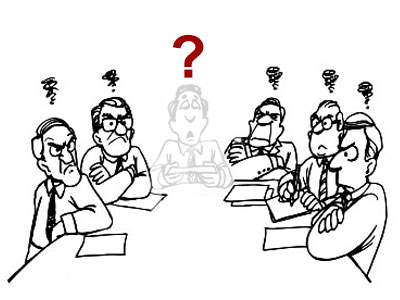So, you’ve made the most difficult decision of your life - that of filing bankruptcy in an effort to reorganize your finances! Your creditors and debt collectors will no longer call you demanding delinquent payments and you’ll feel safe realizing that the bankruptcy trustee is there to handle your creditors. Every Chapter 7 is administered by a trustee, whose main task is to sell off the debtor’s nonexempt property to repay his unsecured creditors. He also watches out for bankruptcy fraud, ensures that the paperwork is accurate and conducts an inspection into your finances and property. Much of this fact finding is done in the creditor’s meeting which is also called 341 hearing. If you’re filing for Chapter 7, you should attend the meeting of creditors.
The creditor’s meeting - It’s purpose
The primary purpose of the creditor’s meeting is to provide an opportunity for the creditors to meet the debtor and his counsel and review materials, important financial documents and information in the debtor’s bankruptcy filings. Another purpose of the creditor’s meeting is to give the trustee the chance to inquire the debtor regarding his accuracy, completeness, truthfulness and the basis of the information that is contained in the debtor’s petition, statements and schedules.
Creditor’s meeting - Location and timing
When you file Chapter 7 bankruptcy, the 341 meeting will be set for minimum 20 days but not more than 40 days after you file your case. The Section 341 hearing will take place in a meeting room, often in a government building but never in a courtroom. No judge will be present at the 341 meeting, rather it is conducted by your Chapter 7 trustee. As soon as you file the petition, the inspection of the trustee begins and he will start reviewing your paperwork. He will assess all your debts, expenses, income and your Statement of Financial Affairs as well since it offers a brief knowledge of the last few financial transactions. Your previous tax returns and pay stubs are also subject under investigation.
What documents to carry to the Meeting of Creditors?
You should carry your photo identification and proof of your Social Security number to the meeting of creditors. In fact, the bankruptcy trustee doesn’t conduct this meeting if you don’t have these documents and hence if you forget them, you’ll have to return to a later date.
Apart from these, the trustee may also have his individual requirements about what you should carry to the meeting. If you have an attorney, the trustee will notify him and if you don’t, he will contact you directly. Here are some typical documents that your Chapter 7 trustee may ask you to bring to the 341 creditor’s meeting.
- Car titles
- Copies of recorded mortgage documents
- Property deeds
- Tax returns
- Bank statements and
- Pay stubs
Not showing up to the Meeting of Creditors - What to do
There might arise circumstances due to which you fail to attend the bankruptcy meeting of creditors at its scheduled time. What should you do? Will the bankruptcy trustee dismiss your case? Well, yes, your case will be dismissed and if you can’t make it to the creditor’s meeting, you require notifying your trustee immediately. Whether or not your 341 hearing will be rescheduled will entirely depend on the reason for missing it. Here’s what you can do if you can’t attend this meeting.
The trustee dismisses your case
But for some rare circumstances, your attendance at the creditor’s meeting is highly mandatory. It’s needless to mention that bankruptcy trustees have busy calendars and they don’t prefer re-scheduling hearings. As a consequence, if you miss the hearing, the trustee normally will dismiss the case.
Situations that justify rescheduling your creditor’s meeting
Usually, there are just few reasons that justify not attending the meeting of creditors. Take a look at some of the most common reasons due to which rescheduling won’t be a big issue.
- Family or medical emergency
- Imprisonment
- Crucial medical condition
- Active military service or
- Some other convincing reason
Notifying the trustee right away
If you come to know that you won’t be able to attend the meeting of creditors, you should notify the trustee as soon as possible. If you have a valid reason that justifies postponing your hearing or giving you the permission to appear telephonically, your trustee will inform you about the new hearing date. If your reason doesn’t seem to be valid enough, your case will be dismissed.
Most debtors miss their creditor’s meeting due to conflicts with their travel schedule or work pressure and unfortunately, these are not valid reasons to reschedule your hearing. However, your trustee might still agree to postpone your hearing to another date. Hence, it is in your best interest to inform your trustee promptly so that he gets enough time to reschedule it. On the other hand, if your case is dismissed, you can refile immediately.
Post creditor’s meeting
In most cases of Chapter 7 bankruptcy, after the creditor’s meeting, the trustee abandons all interest in the estate and the debtor obtains a discharge in 60 days. However, if the meeting reveals that the debtor has nonexempt property, the trustee might examine the property and appraise it in order to determine the value of it. If the property has enough value, the trustee might consider selling it off to repay creditors.
Are you confident about your skills of representing your case in the bankruptcy court or in the meeting of creditors? If answered no, you can get legal help from a bankruptcy attorney. He will not only prepare and file your bankruptcy schedules and petition but also represent you at the creditor’s meeting. Hence, if you don’t want to face any adverse situations due to silly mistakes, it is better to get help of an attorney.









